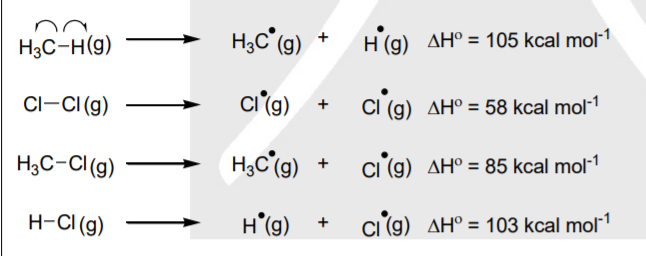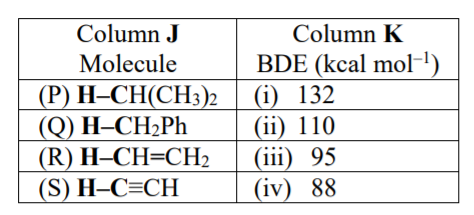The amount of energy required to break a bond is same as the amount of energy released when the same bond is formed. In gaseous state, the enrgy required for hololytic cleavage of a bond is called Bond Dissociation Energy(BDE) or Bond Strength. BDE is affected by s-character of the bond and the stability of the radicals formed. Shorter bonds typically stronger bonds. BDEs for some bonds are given below: 
For the following reaction
CH4(g)+Cl2(g)light−−→CH3Cl(g)+HCl(g)
the correct statement is
Initiation step is exothermic with ΔH∘=−58kcalmol−1
Propagation step involving .CH3 formation is exothermic with ΔH∘=−2kcalmol−1
Propagation step involving CH3Cl formation is endothermic with ΔH∘=+27kcalmol−1
The reaction is exothermic with ΔH∘=−25kcalmol−1
Step by step video & image solution for The amount of energy required to break a bond is same as the amount of energy released when the same bond is formed. In gaseous state, the enrgy required for hololytic cleavage of a bond is called Bond Dissociation Energy(BDE) or Bond Strength. BDE is affected by s-character of the bond and the stability of the radicals formed. Shorter bonds typically stronger bonds. BDEs for some bonds are given below: For the following reaction CH_4(g) + Cl_2(g) overset(light)rarr CH_3Cl(g) + HCl(g) the correct statement is by Chemistry experts to help you in doubts & scoring excellent marks in Class 12 exams.
Updated on:21/07/2023Topper's Solved these Questions
Similar Questions
The amount of energy required to break a bond is same as the amount of energy released when the same bond is formed. In gaseous state, the enrgy required for hololytic cleavage of a bond is called Bond Dissociation Energy(BDE) or Bond Strength. BDE is affected by s-character of the bond and the stability of the radicals formed. Shorter bonds typically stronger bonds. BDEs for some bonds are given below:

Correct match of the C-H bonds(shown in bold) in column J with their BDE in column K is
View SolutionBond energy
View Solution
Knowledge Check
Energy required to break one bond in DNA is
A10−10JB10−18JC10−7JD10−20JEnergy required to break one bond in DNA is approximately
A~1eVB~0.1eVC~0.01eVD~2.1eVThe bond energy is the energy required to
Adissociate oneemole of the substanceBdissociate bond in 1 kg of the substanceCbreak onemole of similar bondsDbreak bonds in one mole of substance
Why is more energy required to break a sigma bond than a pi bond?
View SolutionBond Energy and Bond dissociation energy || Resonance energy
View SolutionThe bond energy is the energy required to
View SolutionHalogen with lowest bond dissociation energy is
View SolutionCorrect order of bond dissociation energy
View Solution
